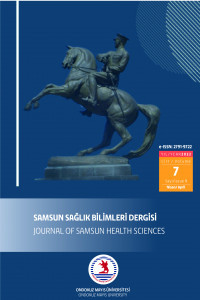FOMGET KADIN FUTBOL TAKIMI SPORCULARININ BESLENME DURUMUNUN VE ORTOREKSİYA NERVOZA VARLIĞININ DEĞERLENDİRİLMESİ
Beslenme, Futbol, Kadın sporcu, Ortoreksiya nervoza
EVALUATION OF NUTRITIONAL STATUS AND PRESENCE OF ORTHOREXIA NERVOSA IN FOMGET WOMEN’S FOOTBALL TEAM ATHLETES
Female Athlete, Football, Nutrition, Orthorexia Nervosa,
___
- Abbott, W., Brett, A., Brownlee, T.E., Hammond, K.M., Harper, L.D., Naughton, R.J., Anderson, L., Munson, E.H., Sharkey, J.V., Randell R.K, & Clifford, T. (2021). The prevalence of disordered eating in elite male and female soccer players. Eat Weight Disord, 26, 491–498. doi: 10.1007/s40519-020-00872-0.
- Arusoğlu, G., Kabakçı, E., Köksal, G., & Kutluay Merdol, T. (2008). Ortoreksiya Nervoza ve Orto-11’in Türkçeye Uyarlama Çalışması. Türk Psikiyatri Dergisi, 19(3), 283-291.
- Baysal, I., & Kızıltan, G. (2020). Spor Yapan Bireylerin Yeni Besin Korkusu ve Ortoreksiya Nervoza Eğilimleri ile Beslenme Durumları Arasındaki İlişkinin Belirlenmesi. Bes Diy Derg, 48(3), 48-55. doi: 10.33076/2020.BDD.1361.
- Clifford, T., & Blyth, C. (2019). A pilot study comparing the prevalence of orthorexia nervosa in regular students and those in University sports teams. Eat Weight Disord, 24, 473-480. doi: 10.1007/s40519-018-0584-0.
- Condo, D., Lohman, R., Kelly, M., & Carr, A. (2019). Nutritional Intake, Sports Nutrition Knowledge and Energy Availability in Female Australian Rules Football Players. Nutrients, 11(5), 971. doi:10.3390/nu11050971.
- Currie, A. (2010). Sport and eating disorders - understanding and managing the risks. Asian J Sports Med, 1(2), 63-68. doi: 10.5812/asjsm.34864.
- Dobrowolski, H., & Włodarek, D. (2019). Dietary Intake of Polish Female Soccer Players. Int. J. Environ. Res. Public Health, 16, 1134. doi:10.3390/ijerph16071134. Dobrowolski, H., Karczemna, A., & Włodarek, D. (2020). Nutrition for Female Soccer Players-Recommendations. Medicina, 56, 28. doi:10.3390/medicina56010028.
- Donini, L.M., Marsili, D., Graziani, M.P., Imbriale, M., & Cannella, C. (2005). Orthorexia nervosa: validation of a diagnosis questionnaire. Eat Weight Disord, 10(2), e28–e32. doi: 10.1007/BF03327537.
- Dunn, T.M., & Bratman, S. (2016). On orthorexia nervosa: A review of the literature and proposed diagnostic criteria. Eating Behaviors, 21, 11-17. doi:10.1016/j.eatbeh.2015.12.006.
- Jenner, S.L., Devlin, B.L., Forsyth, A.K., & Belski, R. (2019). Dietary intakes of professional Australian football league women’s (AFLW) athletes during a preseason training week. Journal of Science and Medicine in Sport, 22, 1266–1271. doi: 10.1016/j.jsams.2019.06.014.
- Kaçar, M., & Yeşilkaya, B. (2020). Profesyonel kadın futbolcuların beslenmealışkanlıklarının araştırılması. Ulusal Spor Bilimleri Dergisi, 4(2), 116-126. doi:10.30769/usbd.783905.
- Kiss-Leizer, M., Toth-Kiraly, I., & Rigó, A.(2019). How the obsession to eat healthy food meets with the willingness to do sports: the motivational background of orthorexia nervosa. Eat Weight Disord, 24, 465–472. doi: 10.1007/s40519-019-00642-7.
- Malmborg, J., Bremander, A., Olsson, M.C., & Bergman, S. (2017). Health status, physical activity, and orthorexia nervosa: a comparison between exercise science students and business students. Appetite, 109, 137–143. doi: 10.1016/j.appet.2016.11.028.
- Özdengül, F., Yargic, M.P., Solak, R., Yaylali, O., & Bilen Kurklu. G. (2021). Assessment of orthorexia nervosa via ORTO-R scores of Turkish recreational and competitive athletes and sedentary individuals: a cross-sectional questionnaire study. Eat Weight Disord, 26, 1111-1118. doi: 10.1007/s40519-020-01006-2.
- Segura-Garcia, C., Papaianni, M.C., Caglioti, F., Procopio, L., Nisticò, C.G., Bombardiere, L., Ammendolia, A., Rizza, P., De Fazio, P., & Capranica, L. (2012). Orthorexia nervosa: a frequent eating disordered behavior in athletes. Eat Weight Disord, 17, e226233. doi: 10.3275/8272.
- Steffl, M., Kinkorova, I., Kokstejn, J., & Petr, M. (2019). Macronutrient Intake in Soccer Players-A Meta-Analysis. Nutrients, 11, 1305. doi:10.3390/nu11061305. Strahler, J., Wachten, H., & Mueller-Alcazar, A. (2021). Obsessive healthy eating and orthorexic eating tendencies in sport and exercise contexts:A systematic review and meta-analysis. Journal of Behavioral Addictions. doi: 10.1556/2006.2021.00004.
- Surała, O., Malczewska-Lenczowska, J., Sadowska, D., Grabowska, I., & Białecka-Debek, A. (2020). Traits of Orthorexia Nervosa and the Determinants of These Behaviors in Elite Athletes. Nutrients, 12, 2683. doi: 10.3390/nu12092683.
- Yeşil, E., Turhan, B., Tatan, D., Şarahman, C., & Saka, M. (2018). Yetişkin Bireylerde Cinsiyetin Ortoreksiya Nervoza Eğilimine Etkisi. Ankara Sağlık Bilimleri Dergisi, 7(1), 1-9.
- World Health Organization (WHO). Availablefrom: https://www.euro.who.int/en/health-topics/disease- prevention/nutrition/a-healthy-lifestyle/body-mass-index-bmi. Erişim tarihi: 01.12.2022.
- Yayın Aralığı: Yılda 3 Sayı
- Başlangıç: 2021
- Yayıncı: Ondokuz Mayıs Üniversitesi
Hemşire ve Ebelerin Kadınlara Pelvik Kas Egzersizi Öğretimine Yönelik Uygulamaları
Cansu KARADENİZ BENLİ, Nedime Gül DOĞAN ÖZDEMİR, Özen KULAKAÇ
ÜÇ FARKLI KRONIK HASTALIĞI OLAN HASTALARINDA YAŞAM KALITESI VE KONFOR DÜZEYLERININ KARŞILAŞTIRILMASI
Ümmühan AKTÜRK, Behice ERCİ, Gül DURAL
Kronik Hastalığa Sahip Bireylerin Hastalığa Uyumunun Yaşam Kalitesi ile İlişkisi
VİRAL ENFEKSİYON İLE ENFEKTE OLAN GEBE KADINLARIN DENEYİMLERİ: NİTEL ARAŞTIRMA
Fatma ASLAN DEMİRTAŞ, Meltem MECDİ KAYDIRAK, Ümran OSKAY
Planlanmamış Gebeliklerin Yaşanma Sıklığı ve Beden İmajına Etkisi
Cilt Bakımında ve Vücut Banyosunda Kullanılan Klorheksidinin Etkisi: Sistematik Derleme
Nazmiye UĞUR, Meryem Türkan IŞIK
ÜRODİNAMİ KAYNAKLI AĞRI VE ANKSİYETENİN KONTROLÜNDE AROMATERAPİNİN ETKİSİ
Elife KETTAŞ DÖLEK, Gülay ALTUN UĞRAŞ
